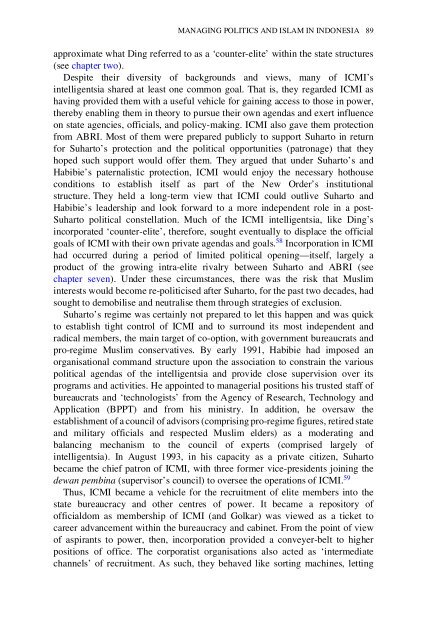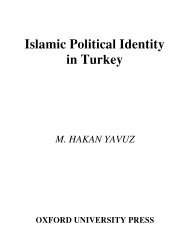You also want an ePaper? Increase the reach of your titles
YUMPU automatically turns print PDFs into web optimized ePapers that Google loves.
MANAGING POLITICS AND ISLAM IN INDONESIA 89approximate what D<strong>in</strong>g referred to as a ‘counter-elite’ with<strong>in</strong> the state structures(see chapter two).Despite their diversity of backgrounds <strong>and</strong> views, many of ICMI’s<strong>in</strong>telligentsia shared at least one common goal. That is, they regarded ICMI ashav<strong>in</strong>g provided them with a useful vehicle for ga<strong>in</strong><strong>in</strong>g access to those <strong>in</strong> power,thereby enabl<strong>in</strong>g them <strong>in</strong> theory to pursue their own agendas <strong>and</strong> exert <strong>in</strong>fluenceon state agencies, officials, <strong>and</strong> policy-mak<strong>in</strong>g. ICMI also gave them protectionfrom ABRI. Most of them were prepared publicly to support Suharto <strong>in</strong> returnfor Suharto’s protection <strong>and</strong> the political opportunities (patronage) that theyhoped such support would offer them. They argued that under Suharto’s <strong>and</strong>Habibie’s paternalistic protection, ICMI would enjoy the necessary hothouseconditions to establish itself as part of the New Order’s <strong>in</strong>stitutionalstructure. They held a long-term view that ICMI could outlive Suharto <strong>and</strong>Habibie’s leadership <strong>and</strong> look forward to a more <strong>in</strong>dependent role <strong>in</strong> a post-Suharto political constellation. Much of the ICMI <strong>in</strong>telligentsia, like D<strong>in</strong>g’s<strong>in</strong>corporated ‘counter-elite’, therefore, sought eventually to displace the officialgoals of ICMI with their own private agendas <strong>and</strong> goals. 58 Incorporation <strong>in</strong> ICMIhad occurred dur<strong>in</strong>g a period of limited political open<strong>in</strong>g—itself, largely aproduct of the grow<strong>in</strong>g <strong>in</strong>tra-elite rivalry between Suharto <strong>and</strong> ABRI (seechapter seven). Under these circumstances, there was the risk that Muslim<strong>in</strong>terests would become re-politicised after Suharto, for the past two decades, hadsought to demobilise <strong>and</strong> neutralise them through strategies of exclusion.Suharto’s regime was certa<strong>in</strong>ly not prepared to let this happen <strong>and</strong> was quickto establish tight control of ICMI <strong>and</strong> to surround its most <strong>in</strong>dependent <strong>and</strong>radical members, the ma<strong>in</strong> target of co-option, with government bureaucrats <strong>and</strong>pro-regime Muslim conservatives. By early 1991, Habibie had imposed anorganisational comm<strong>and</strong> structure upon the association to constra<strong>in</strong> the variouspolitical agendas of the <strong>in</strong>telligentsia <strong>and</strong> provide close supervision over itsprograms <strong>and</strong> activities. He appo<strong>in</strong>ted to managerial positions his trusted staff ofbureaucrats <strong>and</strong> ‘technologists’ from the Agency of Research, Technology <strong>and</strong>Application (BPPT) <strong>and</strong> from his m<strong>in</strong>istry. In addition, he oversaw theestablishment of a council of advisors (compris<strong>in</strong>g pro-regime figures, retired state<strong>and</strong> military officials <strong>and</strong> respected Muslim elders) as a moderat<strong>in</strong>g <strong>and</strong>balanc<strong>in</strong>g mechanism to the council of experts (comprised largely of<strong>in</strong>telligentsia). In August 1993, <strong>in</strong> his capacity as a private citizen, Suhartobecame the chief patron of ICMI, with three former vice-presidents jo<strong>in</strong><strong>in</strong>g thedewan pemb<strong>in</strong>a (supervisor’s council) to oversee the operations of ICMI. 59Thus, ICMI became a vehicle for the recruitment of elite members <strong>in</strong>to thestate bureaucracy <strong>and</strong> other centres of power. It became a repository ofofficialdom as membership of ICMI (<strong>and</strong> Golkar) was viewed as a ticket tocareer advancement with<strong>in</strong> the bureaucracy <strong>and</strong> cab<strong>in</strong>et. From the po<strong>in</strong>t of viewof aspirants to power, then, <strong>in</strong>corporation provided a conveyer-belt to higherpositions of office. The corporatist organisations also acted as ‘<strong>in</strong>termediatechannels’ of recruitment. As such, they behaved like sort<strong>in</strong>g mach<strong>in</strong>es, lett<strong>in</strong>g




